How Charlotte’s NPR station, WFAE, fought news fatigue (and found a hit) with a music podcast
Joni Deutsch, Cole Del Charco, Ju-Don Marshall and Greg Collard, WFAE,This is a series on Better News to a) showcase innovative/experimental ideas that emerge from the Knight-Lenfest Newsroom Initiative and b) to share replicable tactics that benefit the news industry as a whole. This “win” comes from Joni Deutsch, Cole Del Charco, Ju-Don Marshall and Greg Collard of WFAE.
You can also hear all about it on the It’s All Journalism podcast.
Question: What problem were you trying to solve, and why was solving the problem strategically important for your organization?
Answer: Sports. Banking. Bojangles. A lot can be said about the City of Charlotte, but what can be said about the Charlotte music scene? What is #CLTmusic?
When public radio host/producer Joni Deutsch moved from Charleston, W.V., to Charlotte for a new role as podcast lead for WFAE, she asked Charlotteans (native and new to the area) about the Charlotte music scene. Joni received a lot of shrugs in return. That made sense, given how music/arts coverage in Charlotte media had shrunk in recent years, even as the music community and Charlotte populace (of potential music fans left unaware of the region’s music history) continued to grow.
(To note, WFAE started as a music station in the 1980s. In fact, the FA in WFAE stood for “Fine Arts.” But over time, the station reduced its music programming to accommodate for more news coverage. While WFAE does have an HD-2 stream for jazz music, its music/arts coverage is usually relegated to occasional spots/features on radio and online.)
So, we wanted to know how WFAE could produce music content that the community needed, as well as content that filled a void in WFAE’s current program line-up and advanced WFAE’s digital/music presence.
Q: How is this approach related to Table Stakes (e.g. one of the 7 Table Stakes and/or an outgrowth of the Knight-Lenfest initiative, etc.)?
A: While music is the focus, our target audiences drove that focus. So this effort was firmly part of Table Stake #1: Serve Targeted Audiences with Targeted Content. Before we started producing the podcast, we used local market knowledge, perspective and presence to write up the target audiences for this podcast (and, in return, what they needed out of a local music podcast):
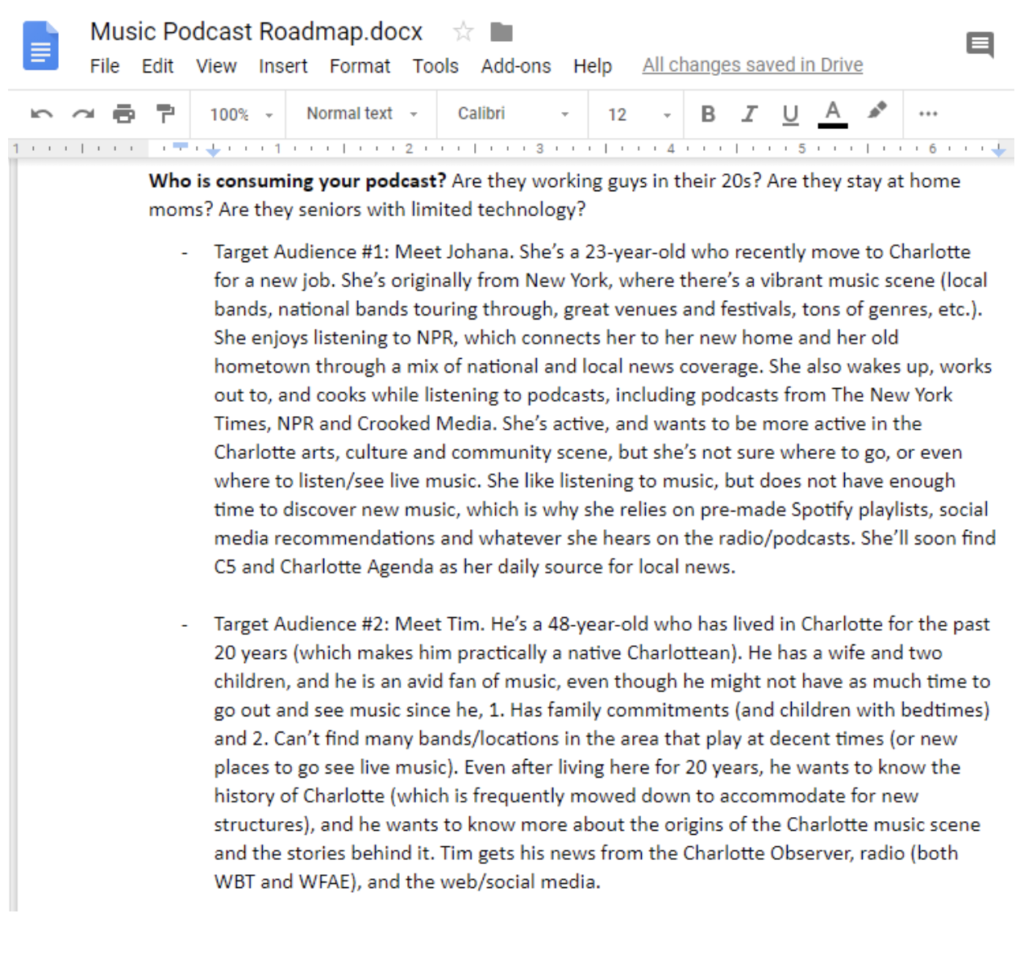
Q: How did you go about solving the problem?
A: This fall, WFAE began a deep dive into the Charlotte music scene with a series featuring interviews and insights from the community who contribute to the Queen City’s “Crown Sound.” From award-winning jazz singers to emerging pop acts, DIY venue owners to established record producers and beyond, the series explores the local music scene through community call-outs for submissions (which resulted in more than 400 submissions from artists of all genres and walks of life from the Charlotte-area). This podcast (which would be called “Amplifier”) would include interviews and branch out into live events and so much more. In a way, Amplifier would allow for diverse Charlotte music communities a space to share stories and songs, thereby giving Charlotte audiences a deeper understanding and appreciation for the local music scene and the need to support it.

The series launched in September 2018 with 20 podcast interviews for 20 days, a unique daily project to kickstart the series and show the Charlotte area the range of talent and music history that was ready to be unearthed. And in that first 20 days, Amplifier hit the Top 30 of all music podcasts on Apple.
Thanks to the support from a local sponsor (OrthoCarolina — which provided WFAE one of the largest underwriting deals in the station’s history), Amplifier now continues as a bi-weekly podcast scheduled to run through June 2019.
Q: What worked?
A: Anyone can make a podcast. But to make a great podcast, one that resonates with listeners, you need to understand what the community needs and how your podcast can provide meaning. When WFAE put a call-out for music submissions (on radio, on our site, on social media, etc.), we created a submission form that had the usual round-up of questions: who are you, what music do you make, where can we find you online, etc. But we also included some key questions that would give us a deeper understanding of the Charlotte music scene and how Amplifier could encourage a thoughtful conversation: what’s it like making music in Charlotte (the good, the bad, etc.), and who has been your favorite person to work with in the Charlotte music scene and why? These questions opened up even more ideas for guests, questions and potential points to shine a light on the music scene.
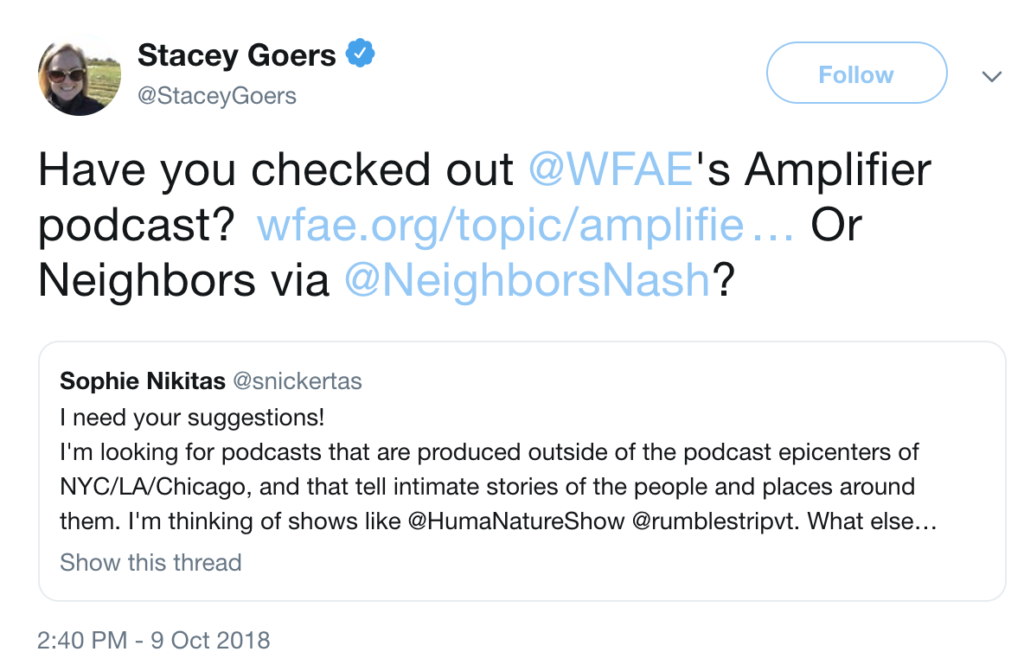
Artists are always in need of eye-catching visuals to promote their work, so Amplifier did just that: by working with local graphic designer Matthew Scott, we were able to create social media-friendly Amplifier graphics for each and every artist featured in the series.
The graphics turned out so well, in fact, that some Amplifier artists used the graphics as social media banners and profile icons.
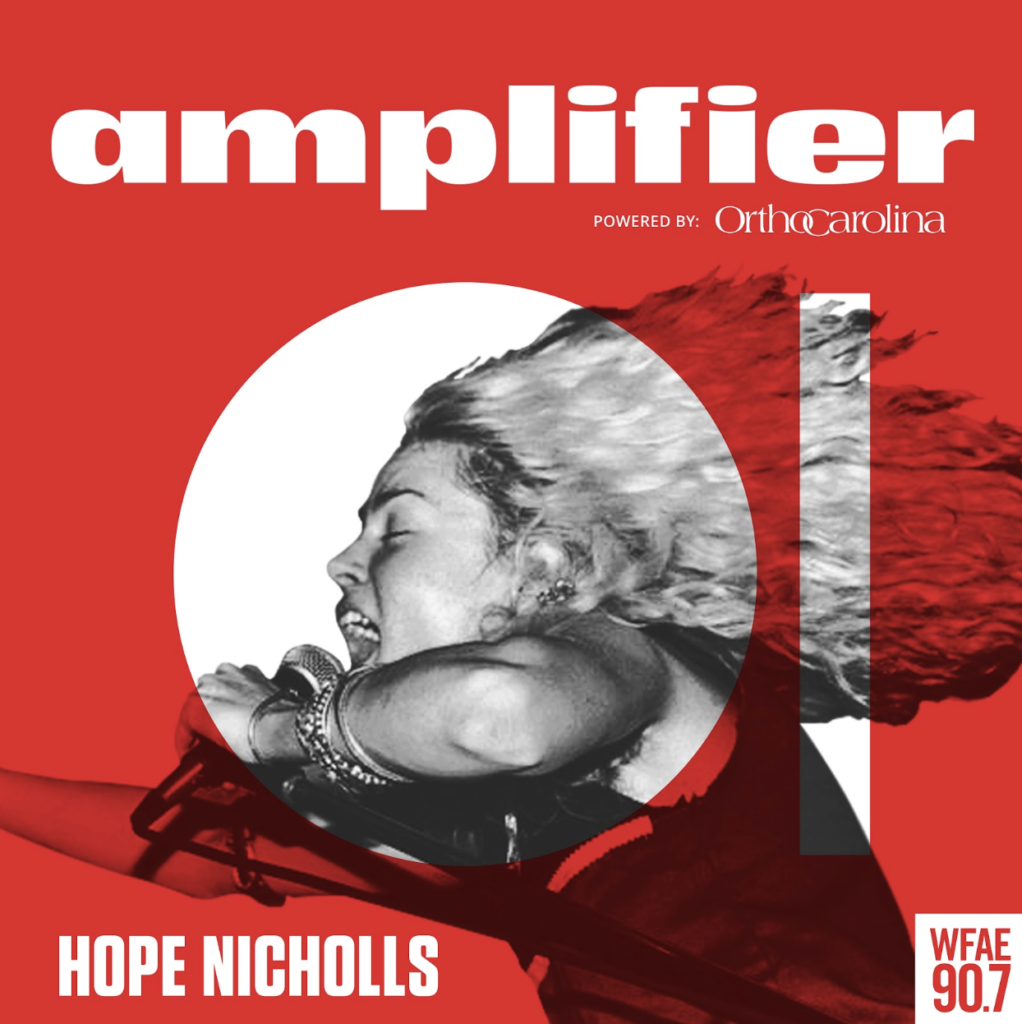
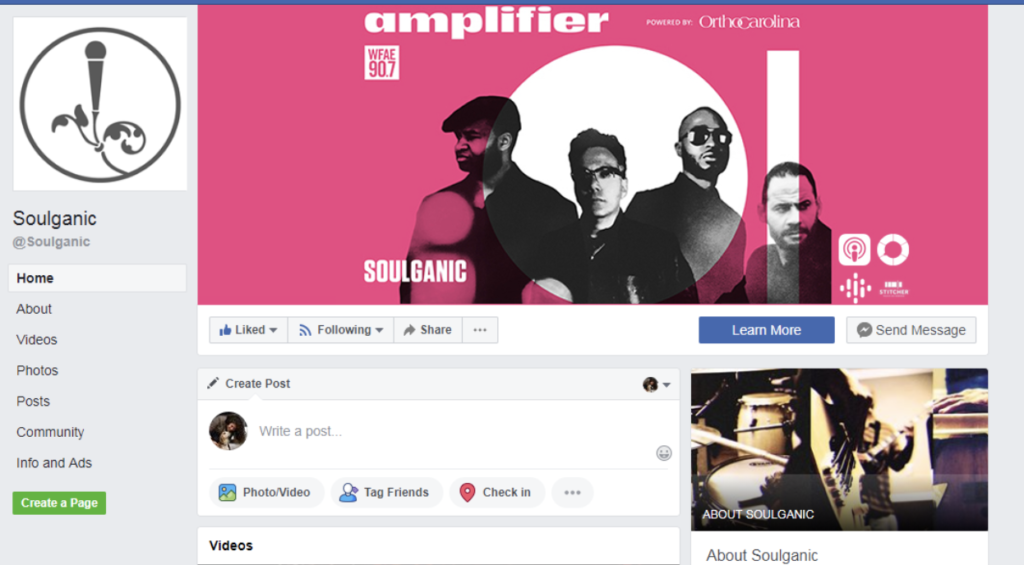
Beyond the podcast, Amplifier’s website also acted as a musical hub. With the help of WFAE digital assistant Jessa O’Connor and web manager Jenn Lang, we created a comprehensive Charlotte music map that listed the locations of venues big and small around the region for those who needed a 4-1-1 on where to see live music in their neck of the woods. We received messages from some Amplifier fans who went to their first shows in Charlotte to see Amplifier-featured acts as a result.
And for those in need of a mixtape, our Amplifier website included a playlist of songs from each of the artists who submitted their work to the series. That amounts to a 12+ hour Spotify playlist, which Charlotte music fans (and even the musicians themselves) could explore and connect with:
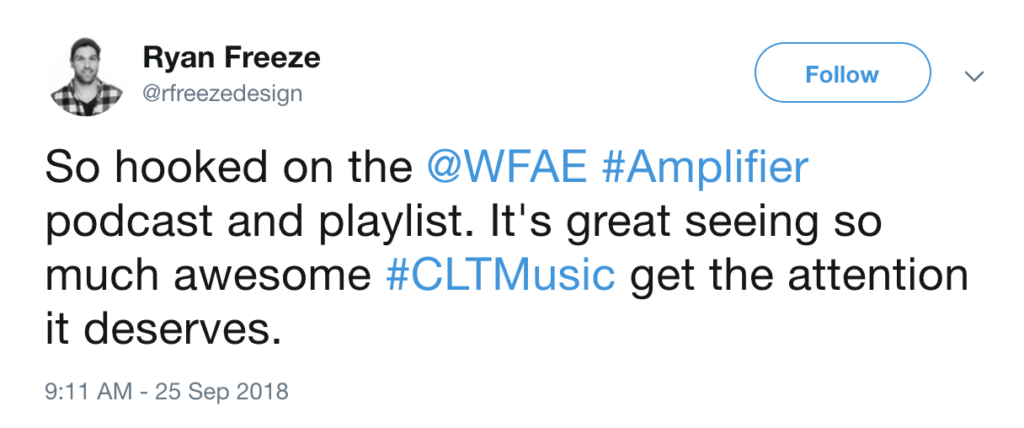
Q: What happened that you didn’t expect?
A: We were surprised by how rapidly this project sparked community encouragement and community collaborations. As soon as the music submission call-out began, Joni began receiving messages from around the region from arts organizations, venues, museums, breweries and businesses to collaborate on local music initiatives around the podcast. It’s clear that this podcast couldn’t come at a better time for the community.
For an example of the reach of this project, the picture below is of Joni interviewing Amplifier act Vadim Kolpakov, a Charlotte-based Russian Roma guitar virtuoso, live at the Blumenthal Performing Arts Center in front of 170+ Charlotte leaders.
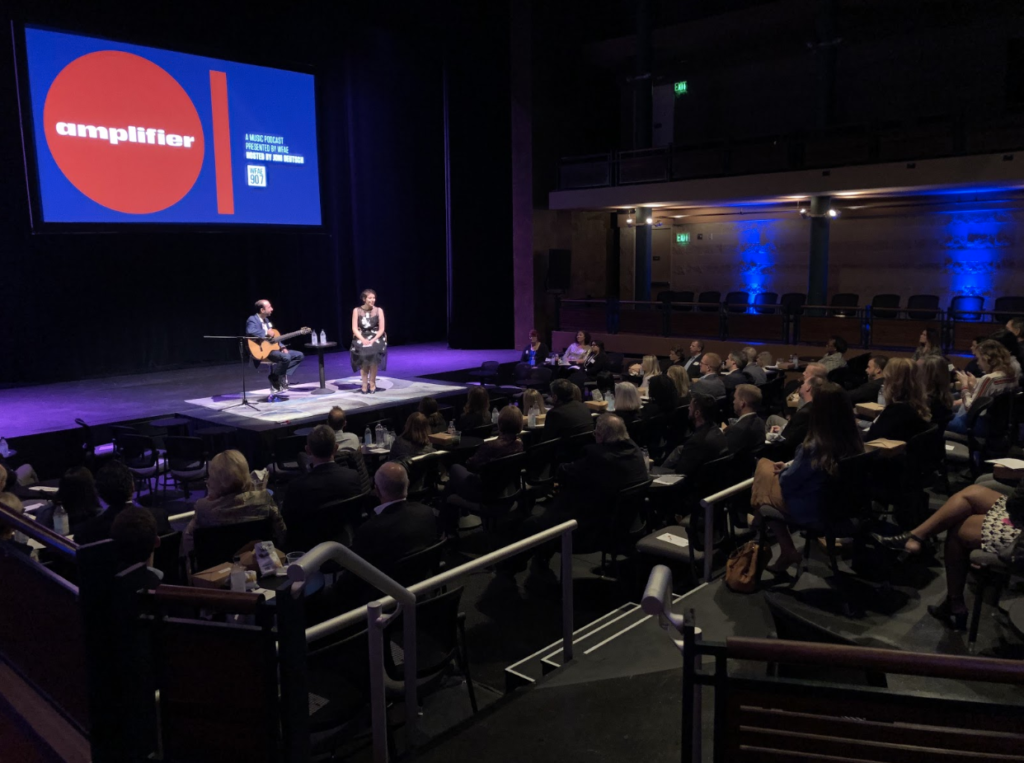
Q: What advice would you give to others who try to do this?
A: Four things:
- Find gaps: Know what’s there, but more importantly what’s missing and what’s missed by other media outlets.
- Talk to your community innovators: Go to lunch or coffee with them, brainstorm with them over common goals, find ways to collaborate with them.
- Find ways to energize the team: What are meaningful things that can be done with this project? What are light lifts — and energizing efforts — for the individuals on your team?
- Celebrate your wins: Keep track of the numbers, the audience engagements, the emails and tweets and comments and event/collaboration moments you’ve received. These moments (on their own or even on a huge list) act as a beautiful reassurance that you’re on the right track and your work means the world to your community.
Q: Anything else you want to share about this initiative?
A: Steal this idea! Seriously. This idea was sparked in West Virginia with Joni Deutsch’s award-winning 30 Days of #WVmusic podcast and continued to Charlotte as Amplifier. There is a music scene in every city, each with stories and audiences that deserve each other.